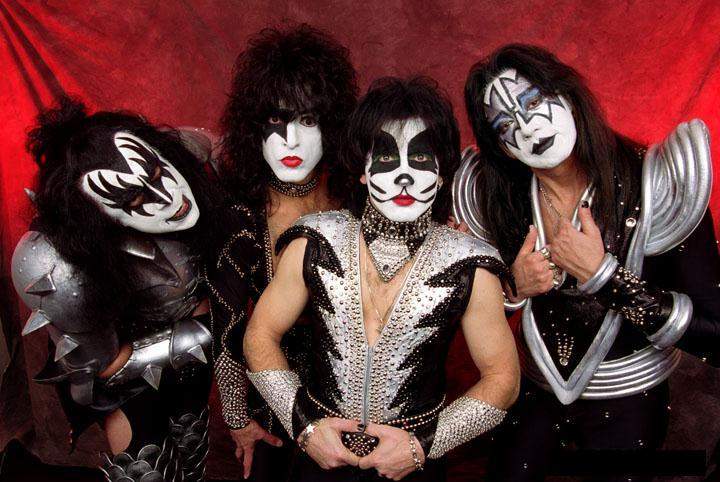As KISS began the 21st Century, the band was as ubiquitous as ever. In August of 1999, Gene Simmons produced a dopey but fun, period teen comedy, Detroit Rock City, about a group of teens circa 1978 trying to get tickets to see KISS at Cobo Hall in Detroit. That same month, KISS made an appearance on WCW Monday Nitro, culminating on the debut of the officially licensed KISS wrestler called The Demon.

Unfortunately, The Demon ended up being about as successful in the wrestling ring as Music From “The Elder” ended up being on the Billboard charts. Detroit Rock City didn’t fare much better but did become a minor cult classic for teen comedy buffs. The buzz that surrounded KISS’ reunion in 1996 had now subsided to a low, droning hum. So KISS did what any aging rock band would do to recapture the public’s attention… stage a “Farewell Tour”. With the always controversial/sometimes entertaining Ted Nugent and a reunited minus Sebastian Bach lineup of Skid Row as opening acts, KISS started the tour in March 2000. The tour didn’t do much to revive interest in the band and by then, old tensions had reignited and had become even worse than ever. By the end of the tour, it became apparent to the KISS Army, that it really was the end. Perhaps not for KISS as a whole but certainly for the original lineup. Upset by his perceived mistreatment by the rest of the band, Peter Criss added a tear to his Catman makeup and destroyed his drum set on the final date of the tour. To the surprise of no one, Criss’ contract with the band was not renewed and he was not invited to join the band on the Japanese/Australian leg of the Farewell Tour in early 2001.

To replace Peter Criss, Gene and Paul brought back their drummer from 1991 to 1996, Eric Singer. To the dismay of many fans, Eric Singer donned Criss’ signature “Catman” makeup instead of having his own makeup design. Ace Frehley miraculously managed to stay with the band for that tour of Asia and Australia as well as a few corporate gigs. His drug and alcohol problems were now worse than ever and he made his final appearance with the band at the closing ceremonies of the 2002 Winter Olympics in Salt Lake City.
Even though the original lineup was once again no more, Gene Simmons & Paul Stanley had no intention of actually retiring. They brought in their longtime right hand man, Tommy Thayer, the former guitarist for a ’80s hair metal also ran called Black N Blue. Thayer also once played Ace Frehley in an “officially endorsed” KISS tribute band in the early ’90s and had even donned the Spaceman makeup a few times during the Farewell Tour when the band was afraid that Ace wouldn’t show up. So when Ace proved to be too much of a liability, it was natural that they just inserted their favorite tribute band Ace into the band. *bites lip*
However, almost as soon as Tommy Thayer replaced Ace and Gene & Paul fulfilled their dream of having the Spaceman and Catman in the band without having to deal with Ace & Peter, Peter Criss somehow reentered the mix and again replaced Eric Singer. KISS was going to go to the well one more time and do Alive IV but they weren’t just going to do another plain ol’ live rock and roll album, they were going to cash in on the trend of rock bands doing albums with symphonies. And the symphony was going to wear KISS make up! No way that this could suck! Recorded in February 2003 in front of 50,000 KISS lovin’ Australians at Melbourne’s Docklands Stadium, KISS Symphony: Alive IV, is certainly up there with Music From “The Elder” and Carnival of Souls as one of KISS’ oddest albums.
Later in 2003, the line up of Gene, Paul, Tommy Thayer, and Peter Criss opened up for Aerosmith in one of the biggest tours of the year. Reportedly, one of the only reasons that the band retained Peter was because Aerosmith insisted on only playing with KISS if it was the original lineup of the band but eventually, settled if they could have 3 out of 4. Many of the reviews of the tour claimed KISS outshined the headliner but the fact was that “The Hottest Band on The Planet'” (who sold out Dodger Stadium a few years earlier) was now just an opening act (although they “co-headlined” and both bands played almost equally long sets, KISS opened the show on every date of the tour). At the end of the tour in December 2003, Peter once again left the band, this time for good. For a second time, Eric Singer was welcomed back behind the drumkit.

At this point, it seemed like KISS was done as a band that produced original music. Sure, they would tour on a regular basis, playing the casino and Midwestern festival circuit as well as the occasional tour of half empty outdoor summer sheds with the likes of Poison but it seemed like Psycho Circus may have been the end for them as a recording band. With the record industry deteriorating rapidly in the ’00s, Gene Simmons admitted as much that a new KISS album didn’t make sense. But HEY! BUY OUR NEW GREATEST HITS ALBUM and the Rock The Nation Live DVD to relive KISS Klassics.
But even aging millionaire rockers need a creative outlet so KISS once again released solo albums. *cue collective groans*. Gene was the first out of the gate with the appropriately titled 2004 album, Asshole. Like his 1978 solo album, the record featured collaborations from every corner of the record industry. Dave Navarro played lead guitar on the first single, a way too faithful cover of Prodigy’s “Firestarter” (!!!). The Demon collaborated with Dweezil and Ahmet Zappa to finish one of their dad, Frank’s unfinished tracks. Weirdest of all, Gene Simmons finally released the song that he and Bob Dylan co-wrote during the making of Revenge way back in the early ’90s, “Waiting For The Morning Light”. The song is way less interesting than it sounds, it’s basically another unsuccessful attempt by Gene to ape a Beatles’ Help! era ballad.
Paul Stanley was next out of the gate with his 2006 album, Live to Win. I actually had moderately high expectations for this once since Paul has always been my favorite songwriter of the group and he hadn’t had an outlet to produce new songs for almost a decade. Perhaps the record would include another “Strutter” or “Detroit Rock City”. But perhaps not. Like he did in the ’80s, Paul Stanley relied heavily on professional songwriters like Desmond Child and Holly Knight to try and replicate the success of Bon Jovi. However, as disappointing as the album was, the tour to promote it was tremendous. Backed by a group of top shelf session players, The Starchild toured clubs and theaters across the country, playing a kick ass blend of forgotten KISS gems, songs from his ’78 solo album, and a few obligatory songs from the new album. In my mind, it’s not a stretch to call the live CD/DVD from that tour (One Live KISS), the third best KISS related live album behind Alive! and Alive II.
Not wanting to be outdone, the ex members of KISS wanted to get in on the solo album action. Peter Criss had a rather turbulent ’00s. In edition to being kicked out of and/or leaving the band (depending on whose account you believe), The Catman also battled breast cancer. He also released what is, in my mind, the worst KISS related album ever, 2007’s One For All. Peter Criss’ solo career is the definition of the term “The road to hell is paved with good intentions”. Reading his autobiography (which will be reviewed in a future edition of Connor’s KISS Korner), Peter’s passion for his solo work really comes across. He’s not just a guy doing a solo album for the sake of doing a solo album like Gene. But man oh man, I wish somebody had been around to second guess some of his decisions. This album has everything from Catman singing standards with Paul Shaffer and Will Lee from The CBS Orchestra to a song damning Ace Frehley’s mistreatment of him during the reunion tour that is a total ripoff of Pink Floyd’s “Brain Damage/Eclipse”. Peter Criss’ ’78 solo album was fairly bad and his solo albums from the ’80s and ’90s weren’t much better (if at all) but they all look like Revolver compared to this piece of hooey.
Finally sober and playing with a clear head, Ace Frehley released his first solo album in twenty years, Anomaly. Given that Ace was the only one who had anything resembling a successful solo career, it’s no surprise that he produced the best solo album out of the four we’ve mentioned in this article. However, the album wasn’t a lost classic like his ’78 album. Just workman like, solid but forgettable sleaze rock like his work with Frehley’s Comet. However, the commercial that promoted the album was incredible.
These solo albums, successful or not, showed that Gene & Paul still needed a creative outlet beyond gigs at Casino Rama and the Cadott Rock Fest. I think part of them wanted to dispel criticisms that the lineup with Tommy Thayer & Eric Singer wearing Ace Frehley & Peter Criss’ makeup was nothing but a glorified KISS tribute band. They wanted to show that this lineup could rock as hard as any in KISStory. But would the new KISS produce the same level of rock anthems as the old? Well, tune in next week to find out…
Next Week: KISS lets out a Sonic Boom (BOOM!) and releases their first studio album in eleven years. Then they follow it up by unleashing a Monster and get some long over due respect from The Rock & Roll Hall of Fame. It’s the latest (and perhaps final?) chapter in KISStory!
Photo credit: WWE.com

